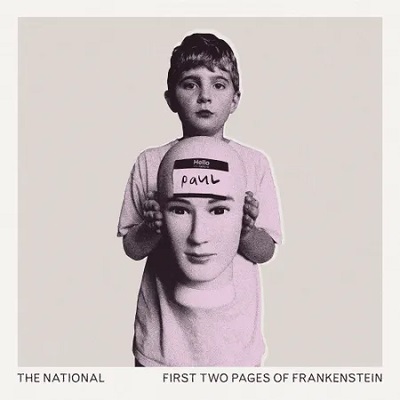Album Review: The National – The First Two Pages of Frankenstein
3 min read
One of the top YouTube comments on Eucalyptus, The National’s lead single from The First Two Pages of Frankenstein, says “nobody writes Sad dad songs like The National”. “King of sad dad songs” is a title that’s more often levelled as a criticism of The National’s sound than in praise but is indicative of how The National manage to be divisive in their inoffensiveness. On The First Two Pages of Frankenstein The National do sound formulaic however. 2017’s Sleep Well Beast saw the band dabble with fuzzy electronics, while Trouble Will Find Me felt more roomy and atmospheric than anything they’d put out before. This latest effort finds them retreating into themselves, a mishmash of previous albums that fails to take on its own distinct character.
 That formula is still able to produce some fine results however. On Eucalyptus, lead singer Matt Berninger is expressive and playful with his vocals, a song about dividing possessions after a long relationship. The song treats these artefacts like broken pieces of the relationship as the process of divvying up makes one wonder whether they can be put back together – “what if I reinvented again?” Berninger asks while sorting through the rubble. Though Berninger describes it as “too painful to think about who gets that tree, who gets that plant”, for him Eucalyptus is a “fun song”. It’s a breakup song written with the wryness of having been there before and having to go through it all again. Where Eucalyptus captures how objects can trigger wrenching memories, New Order T-Shirt treats memories themselves as objects and moments from a relationship as mementos. “You in my New Order T-Shirt”, Berninger recalls, “I keep what I can of you” as if treasured snapshots could be stored permanently in a mental cupboard. Berninger’s penchant for metaphors is still very much alive and the strength of The First Two Pages of Frankenstein comes from Berninger’s ability to be vulnerable and his capacity to cast in words the slippery nature of feelings.
That formula is still able to produce some fine results however. On Eucalyptus, lead singer Matt Berninger is expressive and playful with his vocals, a song about dividing possessions after a long relationship. The song treats these artefacts like broken pieces of the relationship as the process of divvying up makes one wonder whether they can be put back together – “what if I reinvented again?” Berninger asks while sorting through the rubble. Though Berninger describes it as “too painful to think about who gets that tree, who gets that plant”, for him Eucalyptus is a “fun song”. It’s a breakup song written with the wryness of having been there before and having to go through it all again. Where Eucalyptus captures how objects can trigger wrenching memories, New Order T-Shirt treats memories themselves as objects and moments from a relationship as mementos. “You in my New Order T-Shirt”, Berninger recalls, “I keep what I can of you” as if treasured snapshots could be stored permanently in a mental cupboard. Berninger’s penchant for metaphors is still very much alive and the strength of The First Two Pages of Frankenstein comes from Berninger’s ability to be vulnerable and his capacity to cast in words the slippery nature of feelings.
The First Two Pages of Frankenstein emerged from the band finding themselves at a crossroads, flirting with the idea of a split. That flirtation rubs off on the sound – there’s nothing new to be gleaned here, no change of direction from what we’ve heard before. This album feels like a sonic and spiritual successor to 2013’s Trouble Will Find Me. It revives a lot of that album’s spaciousness, odes to depression and breakup-melancholy. But Trouble Will Find Me reveals much of what Two Pages of Frankenstein is missing. Where the Trouble Will Find Me instrumentals are robust, Two Pages of Frankenstein’s are too often flimsy, unable to support the weight of Berninger’s voice. This means, as on opener Once Upon A Poolside featuring Sufjan Stevens, Berninger’s vocals can become heavy and laborious; a few songs drag on in this way, bereft of any urgency or drive. The album works best when the band thicken their sound in a song like Eucalyptus or quicken and mix up their rhythms like on Tropic Morning News.
Along with Sufjan Stevens the album includes features from Phoebe Bridgers (twice) and Taylor Swift. Swift’s is the most prominent on The Alcott and dovetails neatly with Berninger but the song fails to excite. Your Mind Is Not Your Friend with Phoebe Bridgers has similar instrumental shortcomings – the lilting piano chord patterns and slowed drum beats are all too familiar by this point. The song has a solid progression though and some great lines from Berninger on depression like “you inherited a fortune from your mother’s side, your sister didn’t get it at all, she survived”. The third verse reveals the inspiration for the album title and many of the albums themes, pulling images conjured by Mary Shelley in the first two pages of her novel Frankenstein that capture a depression and writer’s block Berninger related strongly to: “Tranquilize the oceans / Between the poles / You’re crawling under rocks / And climbing into holes”. Tryingly, however, the sound of writer’s block often comes through in Two Pages Of Frankenstein. It can be, nonetheless, a compelling rut.



